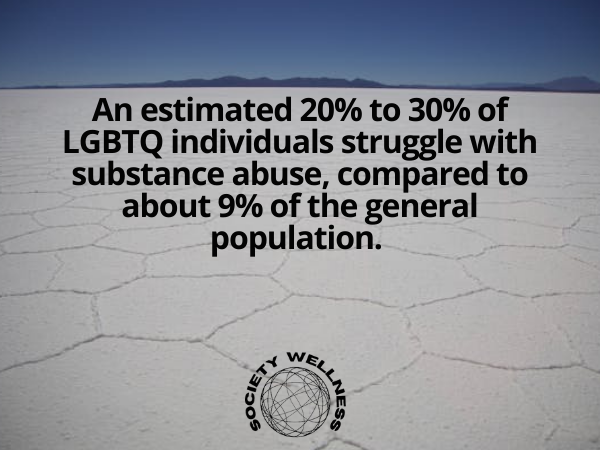Addiction is a chronic disease that requires comprehensive, long-term treatment to achieve recovery. However, for LGBTQ individuals, the journey to sobriety comes with additional challenges. Factors such as discrimination, mental health disorders, trauma, and lack of LGBTQ-affirming treatment options create barriers to accessing the care needed for lasting recovery.
Unfortunately, many traditional rehab centers do not offer specialized support for LGBTQ individuals, which can lead to unaddressed identity-related struggles, feelings of alienation, and ineffective treatment approaches. Quality addiction treatment is not just about helping individuals stop using substances—it’s about providing inclusive, evidence-based care that promotes mental, emotional, and physical healing while addressing the unique experiences of LGBTQ individuals.
This article will explore:
- The importance of high-quality addiction treatment for LGBTQ individuals
- The impact of addiction on LGBTQ mental health and well-being
- How LGBTQ-specific rehab centers provide inclusive, evidence-based treatment
- How to choose the right LGBTQ addiction treatment program
- Why investing in long-term recovery increases success rates
If you or a loved one is struggling with addiction, finding an LGBTQ behavioral health treatment center can significantly improve your chances of achieving lasting recovery.
Understanding Addiction in the LGBTQ Community
Higher Rates of Substance Use
Studies show that LGBTQ individuals are at higher risk for substance use disorders compared to their heterosexual and cisgender peers. According to national data:
- Lesbian, gay, and bisexual adults are twice as likely to struggle with addiction as heterosexual adults.
- Gay and bisexual men are 12 times more likely to use methamphetamine, a highly addictive stimulant.
- Transgender individuals report higher rates of alcohol, opioid, and stimulant misuse, often as a way to cope with discrimination and gender dysphoria.
Mental Health and Addiction in LGBTQ Individuals
Substance use often coexists with mental health conditions such as:
- Depression (LGBTQ individuals are three times more likely to experience major depressive episodes).
- Anxiety and PTSD (due to experiences with discrimination, rejection, or trauma).
- Suicidal thoughts and behaviors (LGBTQ youth are four times more likely to attempt suicide than heterosexual youth).
Without dual diagnosis treatment that addresses both addiction and mental health, individuals are at a higher risk of relapse. This is why choosing a high-quality, LGBTQ-affirming treatment center is crucial.
Why LGBTQ Individuals Need Quality Addiction Treatment
Not all addiction treatment programs are the same, and for LGBTQ individuals, finding an inclusive, evidence-based program can make the difference between relapse and recovery. Here’s why quality care matters:
1. LGBTQ-Affirming Therapy and Mental Health Support
- Traditional therapy models may not address the unique challenges of LGBTQ individuals (such as identity struggles, minority stress, and coming out trauma).
- LGBTQ-affirming therapy focuses on creating a safe, nonjudgmental environment where individuals can explore personal identity while addressing addiction.
2. Dual Diagnosis Treatment for Co-Occurring Disorders
- Many LGBTQ individuals use substances to cope with untreated mental health issues such as anxiety, depression, and PTSD.
- Quality treatment programs integrate mental health care and addiction treatment, ensuring that both conditions are treated simultaneously.
3. Safe and Inclusive Rehab Environments
- Many LGBTQ individuals report feeling unsafe or judged in traditional rehab programs due to misgendering, homophobia, or lack of cultural competency.
- LGBTQ-specific rehab centers offer affirming spaces where individuals can fully focus on their recovery without fear of discrimination.
4. Comprehensive Relapse Prevention and Aftercare Support
- Relapse rates are lower when treatment programs provide long-term support after rehab.
- Quality LGBTQ addiction treatment programs offer continuing care options such as outpatient programs, peer support groups, and alumni networks to prevent relapse.
Investing in high-quality, LGBTQ-specific care significantly increases the chances of successful, long-term recovery.
Types of LGBTQ Addiction Treatment Programs
Finding the right treatment program depends on individual needs, addiction severity, and co-occurring mental health disorders. High-quality LGBTQ rehab centers offer different levels of care to meet various recovery needs.
1. LGBTQ Partial Hospitalization Program (PHP)
- Best for: Individuals who need structured, intensive treatment without full-time inpatient care.
- Includes:
- Daily therapy sessions with LGBTQ-affirming professionals.
- Mental health counseling for depression, anxiety, and trauma.
- Medication-assisted treatment (MAT) for alcohol or opioid addiction.
2. LGBTQ Intensive Outpatient Program (IOP)
- Best for: Individuals transitioning from PHP or those who need flexible treatment while maintaining responsibilities.
- Includes:
- Several therapy sessions per week (individual, group, and family therapy).
- Relapse prevention strategies to support long-term recovery.
- Identity-affirming counseling for LGBTQ-specific issues.
3. LGBTQ Evening Outpatient Treatment Program
- Best for: Individuals who need continued support while working or attending school.
- Includes:
- Evening therapy sessions for accessibility.
- Community-based recovery support and accountability.
- Ongoing relapse prevention and sober living resources.
4. LGBTQ Meth Addiction Treatment Program
- Best for: LGBTQ individuals struggling with stimulant addiction, particularly methamphetamine.
- Includes:
- Specialized therapy for methamphetamine recovery.
- Harm reduction strategies and sober support planning.
- Chemsex education and LGBTQ-specific substance use interventions.
Each of these programs ensures that individuals receive high-quality, affirming care tailored to their unique recovery needs.

How to Choose a Quality LGBTQ Addiction Treatment Program
With many rehab options available, finding the right LGBTQ treatment program is essential for long-term recovery. Consider these factors:
1. Is the Program LGBTQ-Affirming?
- Look for LGBTQ-specific services, gender-affirming policies, and inclusive therapy approaches.
- Check if the staff has training in LGBTQ cultural competency.
2. Does It Offer Dual Diagnosis Treatment?
- Mental health and addiction are interconnected, so programs should address both simultaneously.
3. Are There Long-Term Recovery and Aftercare Programs?
- Continued support after rehab is crucial for maintaining sobriety.
- Alumni programs, LGBTQ peer support groups, and outpatient care improve long-term recovery rates.
4. Does the Facility Use Evidence-Based Therapies?
- Look for programs that offer Cognitive Behavioral Therapy (CBT), Dialectical Behavior Therapy (DBT), trauma-informed care, and MAT.
5. Is It a Safe, Supportive Environment?
- Feeling comfortable and respected in treatment makes a significant difference in recovery outcomes.
By choosing a high-quality LGBTQ rehab center, individuals are more likely to achieve lifelong recovery and improved mental health.
Conclusion
Choosing the right addiction treatment program can be life-changing. LGBTQ individuals deserve affirming, quality care that recognizes their struggles and provides effective solutions.
If you or a loved one is struggling with addiction, help is available. Call LGBTQ Behavioral Health today at 888.964.8116 to learn more about our LGBTQ addiction treatment programs and take the first step toward a healthier, sober future.
FAQ About Importance of Quality Addiction Treatment for LGBTQ Individuals
Why is specialized addiction treatment important for LGBTQ individuals?
LGBTQ individuals face unique challenges in addiction recovery, including higher rates of mental health struggles, discrimination, and lack of family support. LGBTQ-affirming treatment centers provide inclusive, evidence-based care that addresses both substance use and identity-related concerns.
What are the key features of a high-quality LGBTQ addiction treatment program?
A quality LGBTQ rehab center should offer:
- LGBTQ-affirming therapy to address trauma, minority stress, and self-acceptance.
- Dual diagnosis treatment for co-occurring mental health disorders.
- Safe, inclusive environments that respect gender identity and sexual orientation.
- Comprehensive aftercare programs to support long-term recovery.
What types of LGBTQ addiction treatment programs are available?
LGBTQ individuals can choose from:
- Partial Hospitalization Programs (PHPs) for structured, intensive treatment.
- Intensive Outpatient Programs (IOPs) for flexible therapy while maintaining responsibilities.
- Evening Outpatient Programs for continued support during non-work hours.
How can I tell if a rehab center is truly LGBTQ-affirming?
Look for treatment centers that:
- Have LGBTQ-trained staff and therapists.
- Offer identity-affirming counseling and gender-inclusive policies.
- Provide LGBTQ-specific group therapy and peer support networks.
How does dual diagnosis treatment help LGBTQ individuals in recovery?
Many LGBTQ individuals experience co-occurring mental health conditions such as anxiety, depression, or PTSD. Dual diagnosis treatment ensures that both addiction and mental health disorders are treated simultaneously, improving long-term recovery outcomes.

